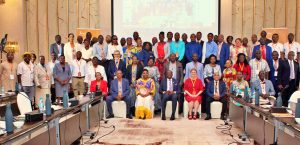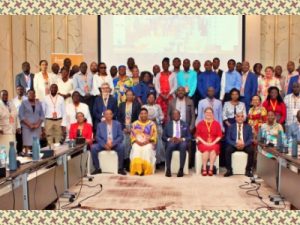The Joint IFAD-Farmer Organisations Statement, Regional Farmers Forum: East and Southern Africa Region
 On Tuesday 25th November 2022, during the closing session of the regional ESA FAFO, Ms Elizabeth Nsimadala, Chair of the ESA steering committee, read out the Joint IFAD-FO declaration, which represents the joint commitment that will guide IFAD/FOs partnerships between November 2022 and end of 2024. The full declaration, including the action plans, is presented below.
On Tuesday 25th November 2022, during the closing session of the regional ESA FAFO, Ms Elizabeth Nsimadala, Chair of the ESA steering committee, read out the Joint IFAD-FO declaration, which represents the joint commitment that will guide IFAD/FOs partnerships between November 2022 and end of 2024. The full declaration, including the action plans, is presented below.
This statement was developed by IFAD and FO representatives who participated in the second regional farmers forum consultative meeting; officially opened by Hon Antony Peter Mavunde, the deputy Minister for Agriculture of the United Republic of Tanzania at the Johari Rotana hotel in Dar es salaam; the declaration represents the commitment from the ESA division to pursue and strengthen the partnership with FOs. The Forum was attended by approximately 104 Farmers’ Leaders (61 physically and 43 virtually attending) from 17 countries and 33 National and regional farmers’ organizations, representing millions of small-scale farmers, artisanal fishers, organic farmers and pastoralists, who interacted with IFAD (ESA Regional Division teams and HQ staff) and five (5) IFAD funded projects from four (4) countries i.e. Lesotho, Kenya, Malawi and Tanzania.
The Forum centred around building sustainable partnerships and collaboration through ESA portfolio and explored opportunities presented by the new financing instruments and initiatives in IFAD (climate financing, private sector financing and ICT4D) to leverage resources to support smallholder farmers transform food systems. The post 2021 UN food systems actions were also discussed with a view of developing a common understanding of the implementation structure under the UNFSS global hub, progress made by IFAD, FOs and development partners (represented by FAO-TZ) in implementing the actions leading to country level UNFSS pathways. We also discussed the achievements made after the first ESA FAFO meeting held in 2017.
Prior to the two-day meeting of the forum a physical meeting of the Regional Steering Committee, whose membership currently draws from ESAFF, EAFF, SACAU, INOFO, WFF, WFFP, WFO, La Via Campesina and IFAD, was held to firm up the preparations for the regional FAFO, including finalization of the agenda and logistics.
Farmers’ Delegates appreciated the meeting held between the FOs leadership and the IFAD associate Vice President for External relations and Governance Ms Satu Santala; they also appreciated the efforts done by IFAD in promoting operational collaboration and dialogue with FOs at country, regional and global levels and especially support provided to farmers to mitigate COVID-19 impacts. Further to that, Farmers’ Delegates reiterated the centrality of partnering with IFAD according to the principles of inclusiveness, pluralism and heterogeneity as agreed since 2005 with the FAFO consensus document. Farmers’ Delegates further emphasized the need of strengthening country and regional level cooperation with IFAD by exploring opportunities around climate finance, private sector engagement and ICT4D.
ESA FAFO participants jointly decided to focus the collaboration at country, regional and global levels and as articulated in the joint action plans. The action plans were developed during break-out sessions that brought together IFAD regional team, IFAD Country Teams, Project Coordinators; staff from IFAD funded Projects, and Farmers’ Representatives. Country level action plans were developed for 17 countries, namely Kenya, Tanzania, South Africa, Lesotho, Malawi, Eswatini, Zimbabwe, Botswana, Madagascar, Mozambique, Burundi, DR-Congo, Rwanda, Zambia, Uganda, Ethiopia and South-Sudan; while regional plans were developed with EAFF, SACAU, INOFO, WFF, WFO and ESAFF.
The action plans are attached and are an integral part of the joint IFAD/FOs commitment. Elements of the national action plans comprised the following:
- Periodic consultations to monitor country level collaboration and proposal of corrective measures to improve cooperation between IFAD supported projects and FOs; including having FOs as part of country level planning and programming through COSOPs
- Support the development of regional and country-level Farmers’ or Rural Producers’ Forums to foster dialogue between regional governments, national government, FOs and development partners for sustainable rural development
- Joint mapping and profiling of FOs (regional, National and local) to explore ways of developing cooperation with IFAD Programmes through the farmer organizations.
- Building on good practices, exploring opportunities to formalise partnerships between IFAD funded projects and FOs to support the institutional development of local FOs hence contributing to their inclusion in IFAD-funded investment projects
In parallel, a strategic discussion was held between the IFAD global/regional Rural Institutions team and representatives of regional, continental and global FOs to kick start a process of dialogue and reflection which will pave the way for 2024 Global FAFO, with some of the strategic elements of the regional discussion as below
- Agreed to look at what has worked, the gaps and areas of improvement in the IFAD programs and partnerships with FOs.
- Establish partnership with the IFAD private sector unit to determine ways that the private sector window will be suitable for farmer organizations to engage
- To jointly work on a long-term fundraising plan for regional and continental organizations since they are not part of the country portfolio.
- Look for ways to enhance engagement of FOs and their members in IFAD financed programs for sub-sectors such as livestock, fisheries, organics, agroecology, and other important food systems currently in the global agenda
This statement and the attached Action Plans were jointly developed by IFAD ESA Regional Division and Farmers’ Delegates and represent a joint commitment that will guide IFAD/FOs country, regional and global level partnerships after validation and endorsement by the IFAD team; this action plan will serve the period between November 2022 and end of 2024. The progress will be reviewed during the Global Farmers Forum to be held in 2024.
Elizabeth Nsimadala – President EAFF/ Chair ESA steering committee
Download the document here;
Download & read the statement here























